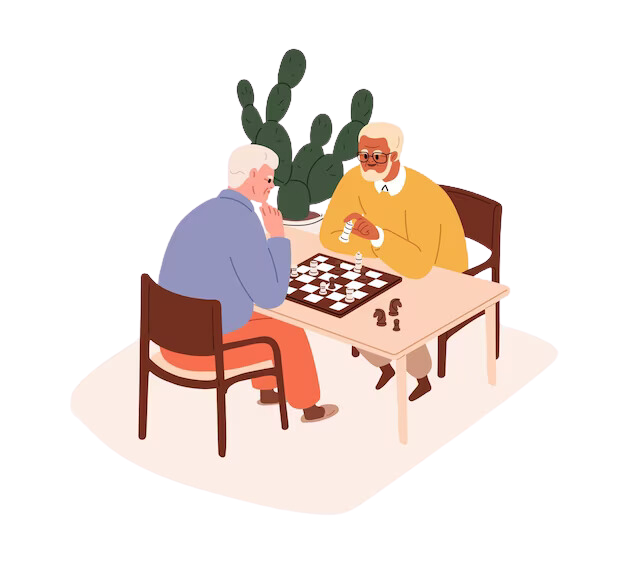Social Connectedness
- Nov 12, 2024
- 5 min read
Updated: Apr 17, 2025
Helping the elderly stay socially connected
Social Activity for Seniors

Staying engaged with the community has various benefits for seniors and can improve their well-being. Social activities are a good way for seniors to stay socially connected with their community. Such activities can also have added benefits towards their mental and physical health depending on the activity.
Encouraging your elder family members to stay socially active can motivate them to seek out social activities.
However, the process of seeking out places and communities to pursue their interests can be daunting, and seniors may avoid it because it is ‘too much of a hassle’.
While offering to help with seeking out activities can further warm them up to the idea, it also helps to involve them in the process and let them decide on the kinds of activities they wish to pursue, as they would be more likely to find such activities more fulfilling.
Being part of a social group with other seniors can foster a better sense of belonging through the shared experiences of ageing. There are several communal structures that facilitate social activities and interaction with other seniors; these include Community Centres, Senior Activity Centres, religious institutions, as well as informal social gathering spots and interest groups.
1. Community Centres

Community Centres provide many programmes and activities for seniors to stay active and pursue their interests while also helping them stay connected to the community.
Community Centre directory:
2. Silver Generation Offices
Silver Generation Offices (SGOs) help connect seniors with community activities and services; SGOs also provide seniors with information on government schemes and guidance on how to utilise the benefits and subsidies that they are entitled to.
SGO information and locations:
AIC Link locations (public hospitals): https://www.aic.sg/about-us/aic-link
3. Senior Activity Centres
Senior Activity Centres (SACs) provide seniors with a space for social and recreational activities. Many SACs also provide specialised care services to seniors with chronic health conditions and psychosocial issues. Though SACs are typically catered to vulnerable seniors, they are open to all seniors looking to socialise and engage in activities.
SAC information and locations: https://www.homage.sg/resources/senior-activity-centre-singapore/
Social Fulfilment Through Volunteerism
Volunteering in the community can also be a way for seniors to stay socially active while giving back to society. Seniors can volunteer in their community through many different organisations; there are volunteering opportunities at SGOs, Community Centres, and other community-based services that seniors can seek out.
Grassroots Volunteering through the People's Association
The People’s Association also provides volunteering opportunities through a network of grassroots organisations. Seniors can visit their nearest Neighbourhood or Residents’ Committee (NC/RC) to find out more and join as a community volunteer. They can also register to be a PA volunteer online using the links provided below.
Volunteering information (PA):
Volunteer registration form (PA):
NC directory:
RC directory:
Seeking Volunteering Opportunities Online
Alternatively, there are also online portals where seniors can find more volunteering opportunities catered to their areas of interest. It should be noted that some guidance and assistance may be needed for seniors to navigate these websites.
Giving.sg:
SG Cares:
Staying connected with information community technology
Information communication technologies (ICTs) such as the Internet, social media, and messaging apps can provide a useful medium for seniors to stay connected to their family and friends.
ICT use might not be suitable for every senior, and factors such as personal motivation and familiarity with technology can affect how useful it is to them.,,
Providing seniors with guidance and training on the usage of ICT is vital for the successful adoption and maintained usage of ICT.
ICT, while useful, shouldn’t be considered as a substitute for social interaction and activities; rather, it should be thought of as a means to facilitate social connections for seniors.
SG Digital
SG Digital community hubs located at community centres and public libraries across Singapore provide 1-to-1 guidance on how to use technology and apps such as WhatsApp and Youtube, as well as guidance on how to access government and other services online.
There are also self-learning resources provided by the SG Digital website that may be helpful for tech-savvy seniors.
SG Digital community hub locations:
Self-learning starter kits:
Self-learning tools:
IMDA hotline: 6377-3800
Seeking Social and Financial Aid for Seniors
Financial difficulties and health issues can lead seniors to compromise their need for social connection in order to keep up with their basic daily needs., Helping to address those difficulties can allow vulnerable seniors to have more freedom to focus on their social needs.
Social Services Offices
If you recognise a senior in your community who may be socially isolated or struggling with finances or daily living activities, the simplest way you can help is by approaching a Social Service Office (SSO) on their behalf. Once a case is referred to an SSO, social workers will get in contact and provide these seniors with further assistance as needed.
SSO list:
SSO locator:
SSO hotline: 1800-222-0000
Community Befriending Service
Community befriending services provide socially isolated seniors a social support structure that provides them an avenue to form meaningful bonds with others. SACs typically provide community befriending services to seniors. SSOs and SGOs can also be approached for help with referrals to befriending services for seniors within their nearby community.
Befriending service providers and contact information (MOH):
E-care locator (AIC):
Social service navigator (NCSS):
Addressing Reluctance Among Elders Towards Receiving Aid
Self-held attitudes toward relying on others and being a burden to society or one’s family can prevent disadvantaged seniors from seeking the help they need.
Self-Reliance and Help Avoidance
Concepts of self-reliance and independence, while typically being healthy attitudes, can become barriers preventing seniors from seeking and receiving help when they need it.
Seniors may not be comfortable receiving help because they may feel indebted or do not want to be a burden to society., It should be noted that the reasons given by seniors for rejecting help may not always reflect their true concerns. However, it is also important not to jump to conclusions regarding their concerns, and to recognise that not all concerns relate to the concept of self-reliance. In other cases, health and mobility issues may be the barrier preventing seniors from seeking help.
Encouraging seniors to elaborate on their reasons can help reveal their underlying concerns, which can then be addressed based on what theiractual concerns are. Some common responses that relate to maladaptive self-reliant attitudes may include:
Not wanting to be a burden to others
Negative views regarding welfare
Viewing the receiving of help as being ‘desperate’
Regarding the issue of self-reliance, reframing attitudes towards interdependency and reciprocity – the idea that we rely on one another on societal and familial levels – can make seniors more receptive towards receiving aid. Some methods to persuade seniors may include:
Framing welfare and financial aid as their entitlement that have already paid for through their taxes can help shift their perspective away from ‘them being a burden to society’ and towards ‘society giving back to them for their contributions’.
Reminding them of the fact that people rely on each other as a basis of our society, and that self-reliance doesn’t have to mean rejecting help from others when needed.
Allowing seniors to reciprocate the help received in some way can make it easier for them to accept help; this ‘giving back’ can be in the form of simple gestures of gratitude
Written and Edited by: Gerald Ong, Xavierlyn Tan Designed by: Tan Ning Xin




Comments